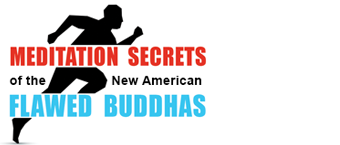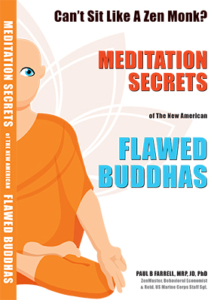Last Updated on August 6, 2020 by Paul Farrell, MRP, JD, PhD

Golf! … Natural “action meditation” perfect for 26,000,000 Americans gone deep in the soul, where “you & the ball are one!”
“When Mitchell and I first spoke, he remarked, ‘The spiritual stuff you think about is something I frequently experience on the golf course. I wish I could experience it when I’m not playing golf.’ I responded, ‘That’s how I feel most of the time, but I lose it when I play golf.’
We made a deal. I would teach Mitchell the rules that make the game of life a joyful, ecstatic expression. Mitchell would teach me the rules that make the game of golf a joyful, ecstatic experience.
Guess what. They are the same rules.”
– Deepak Chopra, The A.I.M. of Golf
Golf is the perfect meditation for millions of Americans – great exercise, you’re enjoying nature outdoors, intense mental training, and an intangible spiritual experience. Jack Nicklaus’s “ability to focus intensely on whatever I’m doing through most distractions” is an exactly the same lesson every meditation master practices and teaches, whether in an Eastern monastery or Western stress management clinic. It’s all the same.
Of course, a golf master like Jack Nicklaus would probably hesitate to compare what he does so naturally with the meditation practices of a great spiritual leader like the Dalai Lama. Although the word meditation may not be a familiar term in golf manuals and digests, we definitely sense the spirit and spirituality inherent in golf whenever golf is discussed.
Find Your Soul in the Swing and “In Between!”
One delightful early classic is Golf in the Kingdom, Michael Murphy’s mystical tale about a young man headed for India in the fifties, headed off to study metaphysics and meditation at guru Sri Aurobindo’s ashram. But first he stops in Scotland to play at the legendary Burningbush golf club. That day his life is transformed as he is paired with a mysterious golf teacher named Shivas Irons who reveals the simple secrets of life through the metaphor of golf:
“Yes, a man’s style o’ play and his swing certainly reflects the state of his soul,” Shivas told the young traveler. As do the moments in between, while you’re on the path to the next hole: “If ye can enjoy the walking’, ye can probably enjoy the other times in yer life when ye’re in between. And that’s most o’ the time; wouldn’t ye say?”
The “in between” times then become a different kind of meditation, a relaxed walking meditation. Nicklaus put it in even simplier, natural terms,
“unless the tee shot finds serous trouble, when I might immediately start processing possible recoveries, I descend into a valley as I leave the tee, either through casual conversation with a fellow competitor or by letting my mind dwell on whatever happens into it.”
Golf Enlightens “The Last Samurai”
We heard the same spirit from Ken Watanabe, the Oscar-nominated Japanese actor who played Katsumoto, the samurai leader in The Last Samurai. When Watanabe first took up golf his endless mistakes often keep him awake at night, ruminating:
“Now I have a change of mind. When I was reading a book about golf, I found a great word for my new attitude: ‘Same walk, same smile.’ If you keep up your pace of how you walk through 18 holes and don’t forget to smile the whole time, you can get a good score. It’s like life and like work, movie work and acting work. It’s the same. Every day’s okay. No problem.”
And in this profoundly simple awareness Watanabe is as enlightened as the Dalai Lama.
“It is all the same – in work or play, golf or life – it’s all in how you play the game, in the swing or in-between. The game of golf, this meditation, your life, the spirit world are there in all—in the swing and in between—in and endless cycle of change and continuity as you “move from peaks of concentration to valleys of relaxation and back again as necessary.”
The Zen Golfer’s Ultimate Koan “You and Ball are One!”
We see it the prolific best-selling author Dr. Deepak Chopra who shortly after taking up the game found a powerful new level of spirituality that he described with the passion of a born-again evangelist. In Golf for Enlightenment Chopra applies the lessons learned in golf to the game of life in a way paralleling his other works, such as Creating Affluence, Quantum Healing, Perfect Health and The Seven Spiritual Laws of Success.
Seasoned golfers may smile at Chopra’s ultra-simple maxims (“you and the ball are one”) but his followers and other newcomers to the game will relish the simplicity, especially from a mind-body guru whose enthusiasm clearly confirms the spiritual and meditative power inherent in playing golf.
Similarly, M. Scott Peck’s Golf and The Spirit shares with us the spiritual journey of this celebrated psychiatrist, the author of the perennial best-selling self-help book, The Road Less Traveled. Peck offers yet another perspective on golf as a metaphor for living, with lessons reminiscent of The Road books.
The Tao of the Ultimate Game of Life: In Six Simple Lessons
After Peck’s powerful reminder that we can “stay in the flow only when we get ourselves out of the way, only when we are empty enough to let the Tao (or the divine) flow through us,” he offers a beautiful summary of his six lessons for winning at the game of golf, and the game of life:
- Be attentive to the hazards ahead of you, but empty yourself of your fear of them.
- Strive to do your best, but empty yourself of your concern with your score.
- Learn from every mistake, but empty yourself of any shred of self-hatred for your imperfections.
- Compete, but empty yourself of shame from not measuring up.
- Play to win, but if you fail to do so, empty yourself of any remorse.
- Remember, every good thing you have been taught, but in that fraction of a second when your club head is connecting with the ball, empty yourself of all your remembering.
Although neither of these gurus-doctors are on the PGA money tour, they clearly speak of the game in such reverential tones that everyone knows deep-down that golf is indeed a spiritual experience – something every golfer knows instinctively.
Knowing the Soul of a Golfer is the “Authentic Swing” Within
And who could forget The Legend of Bagger Vance, the story of a haunted war hero who had long been searching the world for the meaning of his WWI trauma. He is drawn into a mythical match between golf greats Bobby Jones and Walter Hagen. And in that fateful game the hero’s caddy and spiritual guide, Vance, helps him find his ‘Authentic Swing,’ and the doorway to his inner self.
The intense bond between golfers and their game is both fascinating and a source of envy. They have clearly found something special – they seem to be on a strange spiritual path searching for, and finding, something special while playing the game of golf. And isn’t that search what life is all about?
All my life I have been surrounded by guys in this unique society – on both sides of my family and among my friends everywhere in my community. And periodically I’ll read in Forbes, Fortune or Business Week, for example, telling us that on top of all the other benefits, golf is great for business contacts.
You can feel their love the game and see how it is working in their life. For them the game of golf is clearly an experience that helps make them whole persons, physically, mentally, emotionally and spiritually. And yet, if you get into a clubhouse conversation, it is more likely to center on handicaps, clubs, swings, pros, tours, foursomes, tournaments, macho jokes, and how well so-and-so is doing … not about God, meditation and spiritual experiences.
Golfers Share a Secret That Zen Monks Take a Lifetime to Find
But I sense that’s more because the metaphysical world of golf is so very personal that it’s hard to put into words. Just as most golfers aren’t on the pro tour, they’re also handicapped when it comes to talking and writing about golf as a spiritual experience or meditation tool. So that task is left to a Chopra, Peck or Nicklaus, someone who understands the game and has the gift of words too.
Still, most golfers share the secret—that golfers have already found what monks spend decades searching for in sitting meditation. Maybe monks should get out of the monastery for a while. What they’re looking for is right there waiting for them at the club, on the course, in the incredible game of golf.
Golf, the Most Natural Meditation for Millions of Americans
And they reach this enlightenment with a very simply meditation used over and over on an 18-hole course – although they don’t use the words meditation and enlightenment to describe the experience.
Here’s how Jack Nicklaus described this simple meditation in Golf My Way:
“First I ‘see’ the ball where I want it to finish, nice and white and sitting high on the bright grass. Then the scene quickly changes and I ‘see’ the ball going there: its path, trajectory, and shape, even its behavior on landing. Then there is a sort of fade out, and the next scene shows me making the kind of swing that will turn the previous images into reality.”
Golf meditation beats counting your breaths, mantras, chanting, and while your handicap may not drop enough to put you on the pro golf tour it can be as effective as spending years in a Tibetan monastery – well, at least more fun – if you want to achieve the golfer’s unique enlightenment.
About the Author
Dr. Farrell is a Behavioral Economist. His books include The Millionaire Code; The Millionaire Meditation: Stress Management for Wall Street, Corporate America & Entrepreneurs; The Zen Millionaire; The Winning Portfolio; Expert Investing on The Net; Mutual Funds on The Net; and The Lazy Person’s Guide to Investing.
He also published 1,643 columns on DowJones-MarketWatch and for years was their #1 traffic-generating columnist. Before the Internet, he edited & published FNX: Future News Index, a financial newsletter for stock market traders. Earlier he was a Wall Street investment banker with Morgan Stanley, Executive Vice President of the Financial News Network; and Associate Editor of the Los Angeles Herald Examiner.
He has a Doctorate in Psychology, Juris Doctor, Masters in Regional Planning and Bachelor of Architecture. He worked on the Esalen organic farm and served in the U.S. Marine Corps as Staff Sergeant in aviation computer technology.








